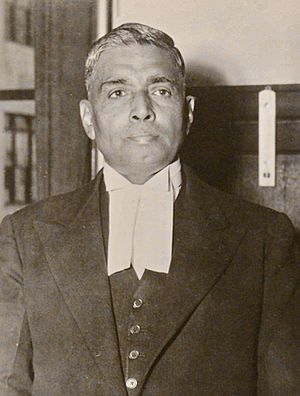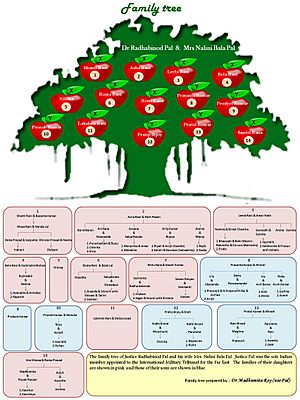Radhabinod Pal facts for kids
Quick facts for kids
Radhabinod Pal
|
|
|---|---|
 |
|
| Born | 27 January 1886 |
| Died | 10 January 1967 (aged 80) Calcutta, India
|
| Nationality | Indian |
| Alma mater |
|
| Occupation | Jurist |
| Known for | Tokyo Trial |
| Awards | Padma Vibhushan |
Radhabinod Pal (born January 27, 1886 – died January 10, 1967) was an important Indian jurist. A jurist is an expert in law. He was a member of the United Nations' International Law Commission for many years.
He was one of three Asian judges chosen for the International Military Tribunal for the Far East. This court is also known as the "Tokyo Trials." These trials looked into Japanese war crimes that happened during World War II. Justice Pal was the only judge who believed all the people on trial were not guilty. There are special monuments in Japan dedicated to him.
Contents
His Early Life and Education
Radhabinod Pal was born in 1886 in a village called Salimpur. This village was in Kushtia District, which was part of British India at the time. Today, this area is in Bangladesh.
He was a very bright student. He passed his first big exams in 1903 and 1905 with high marks from Rajshahi College. He then studied Mathematics at Presidency College in Calcutta. He earned his BA Honors in 1907 and his MA in 1908.
Before becoming a lawyer, Pal worked as a clerk. He earned his first law degree (BL) in 1911. He also taught Mathematics at Ananda Mohan College. While teaching, he continued to study law and earned another law degree (LLM) in 1920. He was the top student in his class! After this, he moved to Calcutta to work as a lawyer in the High Court.
A Career in Law and Education
Radhabinod Pal helped create the Indian Income Tax Act in 1922. This law helped set rules for taxes in India. In 1927, the British Government of India asked him to be a legal advisor.
He also taught law at the University of Calcutta from 1923 to 1936. In 1941, he became a judge of the Calcutta High Court. Later, in 1944, he became the Vice-Chancellor of the University of Calcutta. This is like being the head of the university.
A Judge at the Tokyo Trials
In 1946, Radhabinod Pal was chosen to represent India as a judge at the Tokyo Trials. These trials were held to decide if Japanese leaders were guilty of war crimes after World War II. Judges from 10 other countries were also part of the tribunal.
Justice Pal had a very strong opinion. He disagreed with how the court was using some legal ideas. He argued that the court should not judge people based on new laws that were made *after* the events happened. This is called ex post facto law. He believed it wasn't fair to apply new rules about "Class A war crimes" (like planning an aggressive war) to actions that happened before these rules existed.
Because of this, Justice Pal believed that the defendants accused of Class A war crimes were not guilty. His strong arguments also influenced judges from the Netherlands and France. These three judges wrote down their disagreements, called "dissenting opinions." However, the final decisions of the court were made by a majority vote of all the judges.
Personal Life
Radhabinod Pal had a large family. He had nine daughters: Shanti Rani, Asha Rani, Leela Rani, Bela Rani, Nilima, Roma Rani, Renu Kana, Lakshmi Rani, and Smriti Kana. He also had five sons: Prasanta Kumar, Pradyot Kumar, Pronab Kumar, Pratip Bijoy, and Pratul Kumar.
One of his sons, Pronab Kumar Pal, also became a lawyer. Two of his sons-in-law, Balai Lal Pal and Debi Prasad Pal, also became lawyers. Debi Prasad Pal even became a judge and a government minister.
See also
 In Spanish: Radhabinod Pal para niños
In Spanish: Radhabinod Pal para niños


